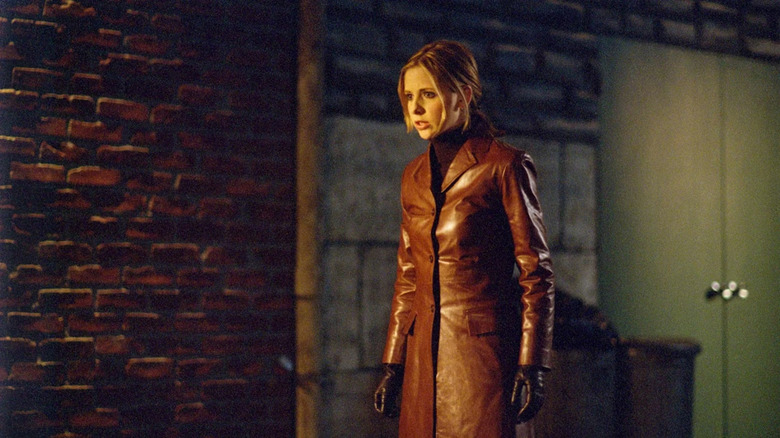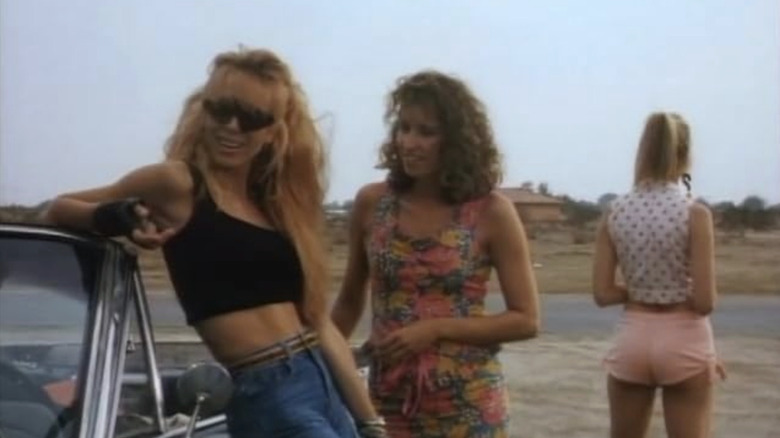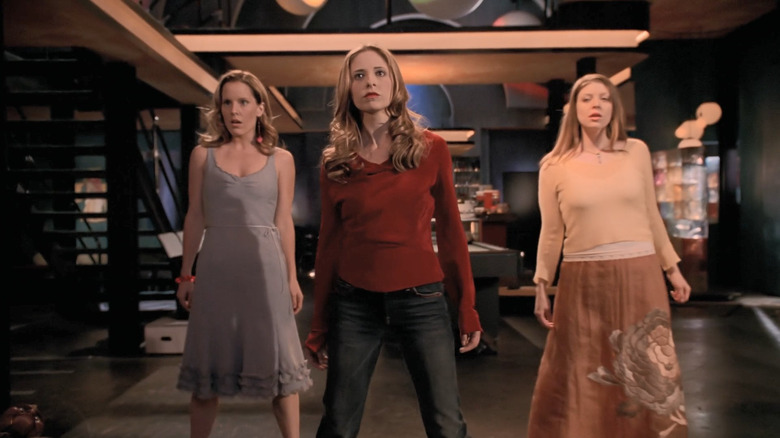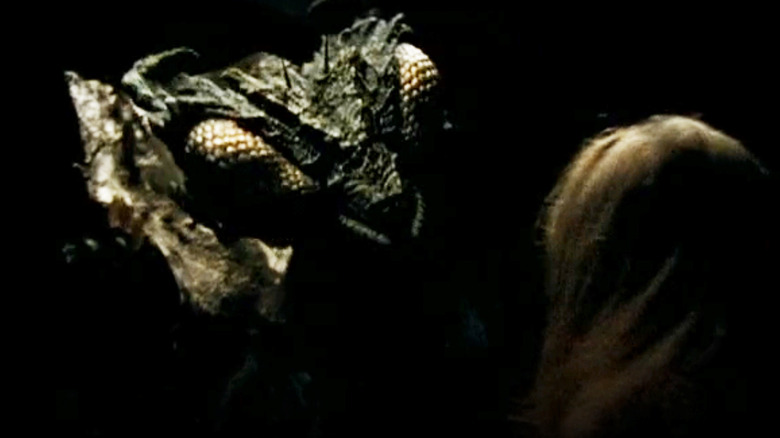How Crappy, Low Budget Movies Inspired Joss Whedon To Write Buffy The Vampire Slayer
"Buffy the Vampire Slayer" remains beloved for its unique mix of horror, teen drama, and genuinely affecting storytelling. Following the much-derided "Buffy the Vampire Slayer" movie in 1992, creator and writer Joss Whedon took the reins of a TV show version and restored his vision of an empowered female protagonist who could take on the forces of darkness and prevail.
As the writer told CBS Sunday Morning, when conceiving of the idea for "Buffy," he "loved the idea of a girl going into a dark alley, and a monster comes, and then she just aces him." Whedon was infamously disappointed in the 1992 movie, openly talking about how director Fran Rubel Kuzui diverged from his original vision and turned it into a light-hearted camp-fest — though the case has been made for "Buffy the Vampire Slayer" actually being a good movie. However, the TV show was, as far as Whedon was concerned, Buffy done right.
But that didn't mean there wasn't a healthy dose of trashy influence at play in the small screen version of "Buffy," too. In fact, Whedon was directly influenced by low budget films when crafting the series.
Buffy's genesis
In a wide-ranging 2003 interview with IGN, Joss Whedon was asked about the genesis of "Buffy the Vampire Slayer" and briefly recalled his "dark alley story." But he went on to explain how he was similarly influenced by a specific form of low-budget, throwback b-movie that abounded in the late-80s. He said:
"When I hit on 'Buffy the Vampire Slayer,' it was right around the time when 'Revenge of the Bimbos,' or 'Attack of the Killer Bimbos' or something — there were a lot of movies coming out that were proto-silly '50s style titles. They were on the video store shelves."
The film Whedon refers to is probably 1988's "Assault of the Killer Bimbos," which starred Elizabeth Kaitan and Christina Whitaker as go-go dancers who find themselves framed for the murder of their boss. Though Whedon clearly took cues from these kind of movies, he evidently didn't like them all that much. The writer continued:
"I worked at a video store. I would watch them, and I'd be like, 'You know what? This is just another bimbo movie. These women aren't empowered at all. They just made up a funny title.' I was like, 'I would like to make a movie that was one of these crappy, low-budget movies, that like the Romero films, had a feminist agenda, had females in it who were people, and had all the fun, all the silliness.'
Whedon claimed his "unofficial minor" during his education was "gender studies and feminism" and has spoken about being heavily influenced by his mother, political activist and teacher Lee Stearns. While these low-budget films were an influence, then, it seems their biggest impact on Whedon was to propel him to make a B movie style project that actually empowered women. That, and silly titles ...
Silly titles
In his IGN interview, Joss Whedon went on to explain how 1984's comedy horror "Night of the Comet," in which the earth's inhabitants are transformed into zombies and/or dust after the planet passes through the tail of said comet, was "a big influence." The main reasons Whedon cites for the film for being so influential were because it had "a cheerleader in it," and that it bore a "title that would actually make people take it off the video store shelves, because it has to sound silly and not boring."
When it came to silly-sounding titles, Whedon applied that exact title formula to "Buffy" herself. In fact, he told IGN that, "It was the name that I could think of that I took the least seriously. There is no way you could hear the name Buffy and think, 'This is an important person.'" That proved an issue when it came time to adapt Buffy for the small screen. As Whedon explained:
"The network begged me to change the title. I was like, 'You don't understand. It has to be this. This is what it is.; To this day, everyone says, 'Oh, the title kept it from being taken seriously." I'm like, 'Well, f**k them. It's a B movie, and if you don't love B movies, then I won't let you play in my clubhouse.'"
So, there you have it. "Buffy" is a B movie. The "silly titles" also extended to the episodes themselves, with early examples including "Never Kill a Boy on the First Date" and "I, Robot... You, Jane" — both of which could easily be names of late-'80s B movie slashers.
Beyond B movies
It's clear that as time went on, the B movie influence was somewhat eclipsed as the show very much came into its own. Considering the cult following the "Buffy" TV series gained, and its enduring appeal among fans, Joss Whedon was clearly on to something when he stood up to the WB network and retained the protagonist's name. Elsewhere, the B movie elements were most pronounced in the early seasons, where the Scoobies would take on a monster-of-the-week each episode. That included a giant bug woman and a mummy girl — and that's after the writers jettisoned some other wild ideas they had for season 1 — who would have been right at home in the films sitting on the shelf of Whedon's video store.
Still, it has to be said that the series' high points were anything but "'silly," and about as far away from B movie schlock as you can get. The season 5 episode, "The Body," which Whedon still considers the best thing he's ever done, is one such example, in which the show presents a harrowing exploration of grief that feels more real than anything you'll ever see in "Assault of the Killer Bimbos." If anything, then, the TV show allowed Buffy to transcend her B movie influence and become something totally new, while still retaining the core element of Buffy being the girl going into the dark alley and "acing" whatever monster dares cross her.



